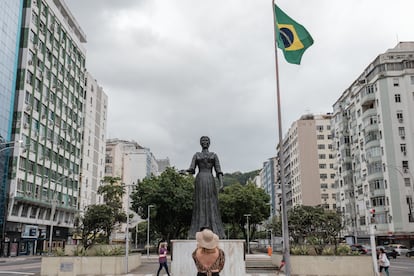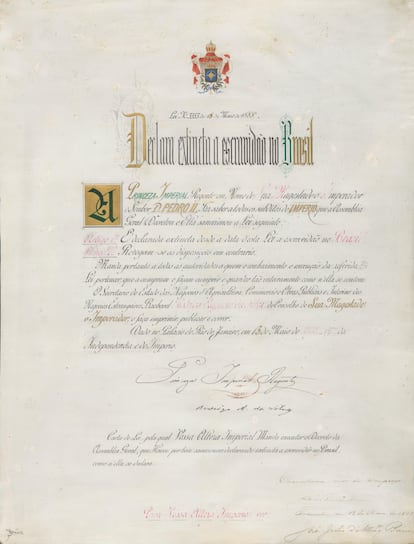Brazil takes princess who abolished slavery 135 years ago off her pedestal
The withdrawal of an award honoring Princess Elizabeth, who in 1888 signed the law that freed thousands of blacks, revives the debate about a figure elevated to heroine status by official history

Guarded as one of its greatest treasures, Brazil keeps a parchment with delicate calligraphy that reads: “Slavery is hereby declared extinct in Brazil.” The so-called Golden Law, of very brief wording and divine halo, was signed by Princess Isabel, daughter of Emperor Pedro II, on May 13, 1888, 135 years ago this Saturday. Brazil ended with a stroke of a pen (literally) more than three centuries of slavery. It was the last country in the Americas to do so. Thanks to this gesture, the princess quickly became a national heroine. She gives her name to a multitude of squares and avenues, and in Rio de Janeiro she has a statue in front of Copacabana beach. Until not long ago she was a figure that generated unanimity, “the redeemer”; but in recent years the pressure of the black movement and of a new generation of historians is revising her figure.
A few weeks ago, the government of Luiz Inácio Lula da Silva renamed an award created in the last days of the Bolsonaro administration (the Princess Isabel Order of Merit) as Luiz Gama, in homage to a self-taught lawyer who was enslaved for ten years and who, thanks to his legal knowledge, won the freedom of more than 500 people, becoming one of the most prominent abolitionist leaders.
For years, the long shadow of the princess hid many struggles, especially those of black abolitionists. Although things are changing, in schools and in the collective imagination the image of the savior princess prevails, as historian Ynaê Lopes dos Santos, author of the book Racismo Brasileiro (Brazilian Racism), acknowledges. She argues that abolitionism was the first great Brazilian social movement: “Unfortunately, what we know about Princess Isabel was told from a very white perspective of Brazilian history. It seems that one fine day she woke up and said ‘slavery is over’, leaving a series of struggles that marked Brazil from 1865-1868 until abolition in the background”, she remarks in a café in Rio de Janeiro, not far from the palace where the princess lived.

It is true that the daughter of Emperor Pedro II had a progressive outlook and sympathy for the abolitionist cause. She did not hesitate to appear in public with camellias, as these flowers became a symbol of the anti-slavery cause, because they were grown in a quilombo (a freemen settlement) in Rio de Janeiro that sheltered fugitives.
The princess was a close friend of André Rebouças - Brazil’s first black engineer and one of the main abolitionists - and even organized charity balls to raise funds for the cause. Nevertheless, the historian recalls that she signed the Áurea law because “she had no other choice”. The law formalized something irreversible. The newspapers of the time even spoke of civil war. Insurgent movements, mass escapes or farm invasions proliferated throughout the country. The provinces of Amazonas and Ceará had already abolished slavery years before, international pressures, especially from England, were already unsustainable, and the ghost of Haiti, the only country where the black rebellion triumphed and led to an independent republic, hovered over the landowning elite.
In Brazil, for a long time, May 13 was an important date. In the first years after abolition, it was a holiday with massive street celebrations. For the freedmen there was no financial compensation or reparations (nor for the owners), but even so “the festivities had immense popular support,” explains Dos Santos. Everything began to decline as the black population perceived that the new Republic inaugurated in 1889 continued to stimulate racial inequality, perhaps not as explicitly as with racial segregation in the USA, for example, but with policies that relegated blacks to a subordinate position, hindered their right to vote and sought to whiten the population by stimulating the arrival of European immigrants, in line with the eugenic theories of the time.

In the symbolic field, the excessive prominence of Princess Isabel began to annoy. From the fifties and sixties onwards, voices arise calling for the commemoration of November 20, the day on which Zumbi dos Palmares, who in the 17th century fought against the Portuguese at the helm of the biggest quilombo in the country, was assassinated. “Zumbi brought a perspective of a more radical break with slavery, and he is a black protagonist, as opposed to a white protagonist,” the historian points out. As of today, November 20 is Black Consciousness Day, a public holiday in several states, and May 13 passes unnoticed on the calendar.
In this redefining of the figure of Princess Isabel, 1988 was a year that marked a before and an after. The current Constitution was approved, the one of redemocratization after the military dictatorship, and the centenary of the end of slavery was also celebrated. Throughout the country, the Unified Black Movement (MNU because of its initials in Portuguese) organized the March Against the False Abolition. One of its most iconic banners read “The princess forgot to sign our work card”. Rio’s samba schools dedicated all Carnival parades to the centennial of the historic milestone. Among tributes and more critical looks, the winner was Vila Isabel, with a parade that solemnly ignored the princess, sang “thank you, Zumbi” and paid tribute to Angola’s heritage in Brazilian culture.
The deconstruction of the idea of the princess as the great savior comes from afar, but has been accelerating in recent times. Another samba school, Mangueira, sang in 2019 that freedom “did not come from heaven or from the hands of Isabel” and had the audacity to present the heroic Princess Isabel on top of a float with her hands stained with blood. At the same time, it vindicated the stories that were hidden behind the “framed heroes”, such as that of Chico da Matilde, also known as Dragão do Mar, the humble sailor who, in the state of Ceará, refused to disembark slaves to distribute them throughout Brazil. His story, like that of Manoel Congo, leader of a revolt in Rio’s main coffee-growing valley, that of Luiz Gama himself and many others, is still little known to the general public, despite the fact that in recent years books, documentaries and exhibitions on their lives have been flourishing.
With this rescue movement in the background, Princess Isabel ends up entering a field of dispute, says the historian. “There is an anti-racist view that argues that the abolition cannot be explained from the centrality of the princess, because it is not enough and because it eliminates the actions of thousands of people, especially blacks, and on the other hand there is a more conservative wing that defends racism as a system of power and that strengthens Princess Elizabeth, because it presents her as if she were the great mother of the enslaved,” she explains.
The figure of the regent who never inherited the throne has been vindicated by the right wing as social movements and the most progressive political sectors have been stripping her of the excesses of benevolence and gratitude. In a session in Congress, one of Bolsonaro’s sons, Eduardo Bolsonaro, defended her against those who do not praise her “perhaps because she is white”. He said this before the also far-right deputy Luiz Philippe de Orleans e Bragança, great-great-grandson of the princess. At the end of December last year, Bolsonaro, already defeated in the elections, dedicated one of his last days in office to create the Order of Merit of Princess Isabel, to reward people or entities that work for the protection of human rights. Among the first to receive the award were himself and his wife, which was interpreted as one of his last provocations.
Lula’s new government renamed the award Luiz Gama, and the extreme right felt it as a grievance against the princess. The Minister of Human Rights, Silvio Almeida (one of the few blacks in the cabinet), refuted the criticism, asking to leave her out of political battles. “In the name of Princess Isabel and her importance to history, the best thing we did was to put an end to this award, which was the result of a misappropriation of purpose,” he said.
Sign up for our weekly newsletter to get more English-language news coverage from EL PAÍS USA Edition
Tu suscripción se está usando en otro dispositivo
¿Quieres añadir otro usuario a tu suscripción?
Si continúas leyendo en este dispositivo, no se podrá leer en el otro.
FlechaTu suscripción se está usando en otro dispositivo y solo puedes acceder a EL PAÍS desde un dispositivo a la vez.
Si quieres compartir tu cuenta, cambia tu suscripción a la modalidad Premium, así podrás añadir otro usuario. Cada uno accederá con su propia cuenta de email, lo que os permitirá personalizar vuestra experiencia en EL PAÍS.
¿Tienes una suscripción de empresa? Accede aquí para contratar más cuentas.
En el caso de no saber quién está usando tu cuenta, te recomendamos cambiar tu contraseña aquí.
Si decides continuar compartiendo tu cuenta, este mensaje se mostrará en tu dispositivo y en el de la otra persona que está usando tu cuenta de forma indefinida, afectando a tu experiencia de lectura. Puedes consultar aquí los términos y condiciones de la suscripción digital.








































